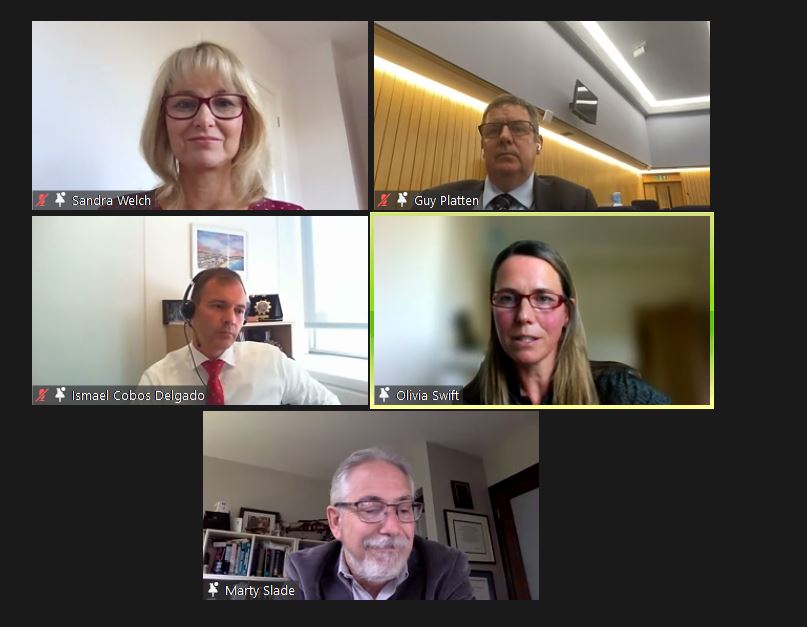Improving charterer and owner communications key to improving seafarer welfare
16 September 2021

Improving communications between charterers and owners has been highlighted as a crucial element in improving seafarer health and welfare, early findings from a new study show.
The findings were presented at London International Shipping Week. They are part of a larger ongoing landmark study by the Seafarers Hospital Society (SHS), Yale University and the Lloyd's Register Foundation (LRF). The study is looking at the effectiveness of the various maritime worker health initiatives taken by shipping companies, charities and the wider maritime sector to keep seafarers healthy and safe.
Sandra Welch, CEO of the Seafarers Hospital Society said: 'Some of the early research undertaken during two roundtables in the summer of 2021 with shipping companies, suggests there are sometimes areas of tension between owners and charterers, as seen recently regarding who should pay into the proposed carbon levy. The study is looking at how these could be addressed in the interests of seafarers' health and wellbeing.
'Organisations which attended the roundtables commented that responsible companies should challenge certain charterers terms – such as no crew-change clauses – and practice. We understand that this is a commercial operation, but seafarer wellbeing must be a priority.'
The findings showed shipping companies acknowledged the role of 'fatiguing and intensive' port calls, the potential to reduce contract lengths, and the need for a 'holistic' culture of care. But they also wanted charterers to share the risks in relation to 'undue pressure and bureaucratic workload on crew,' particularly with 'no crew change' clauses.
The findings reflect the fact that charterers take the predominant financial risks on shipping and are wary of delays due to Covid or other factors. A failure to perform crew changes that resulted in a seafarer staying on board for over 11 months would, however, breach the Maritime Labour Convention.
The full results of study are due to be presented at a hybrid conference at the end of November.
Senior programme manager at LRF Dr Olivia Swift and director of Yale University's maritime Research Centre Dr Martin Slade, said in a statement that the interviews with shipping companies under 'Chatham House' rules (identities not disclosed), showed some key insights into shipping's priorities for improving seafarer health and welfare.
These included 'getting the basics right' for food, water, accommodation, and recreation, followed by minimising 'bureaucratic workload and undue pressure' by automating or moving some aspects ashore as far as possible, followed by a need to improve the 'owner-charterer interface'.
'Research provides a good understanding of what seafarers want and need in terms of keeping well, psychologically, but we hear less from the company perspective,' said Dr Swift and Dr Slade.
'So, a key element of the research has been roundtable discussions specifically for shipping companies to enable them to speak frankly – under Chatham House rules – about what they deem to be possible and worth doing in terms of addressing the long-term risk factors affecting seafarers' psychological wellbeing i.e. those existing prior to Covid.'
Ms Welch said: 'The take-aways from the roundtables vary in their nature and scale – it’s a reminder that seafarers' health and wellbeing isn't addressed purely by focusing on treatment, on individuals, or on one part of an organisation. Taking a preventative approach means looking at risk factors in the round – many of which are structural and embedded, while others are "quicker wins".
'There is a role for everyone in the industry in this shared challenge – it can't only be left to welfare organisations, or to HR.'

Shipping's priorities for action
Priorities for action emerging from the round tables with shipping companies, based on both feasibility and impact, included:
- Getting the basics right: quality, culturally appropriate food and accessible drinking water, suitable accommodation and recreation facilities.
- Minimising bureaucratic workload and undue pressure: automate/move ashore as far as possible.
- Improving alignment between owners and charterers in support of seafarers' health and wellbeing: participants cited the role of charterers in relation to undue pressure and bureaucratic workload on crew and inhibiting crew changes. While the 'interface' wasn't explored explicitly in the round tables, specific measures were deemed addressable and important, such as owners not agreeing to 'no crew change' clauses in contracts with charterers.
- Contract length and timely relief: Participants discussed the feasibility of reducing average/maximum contract length and the importance of communicating with crew and managing its expectations around relief.
- 'Big picture' questions around intensive schedules of port calls and their contribution to fatigue – time for a radical rethink?
- Measuring/evaluating the effect of interventions and the need for industry collaboration in establishing 'what works'.
- Training: mental health training for crew, leadership training, 'ship-shore interface' training were all deemed important and feasible. There was broad support for the Mental Health and Wellbeing Training Standard, developed by the Maritime Charities Group.
- Culture of care: this goes beyond occupational safety and health and relates to the whole package of benefits and support offered to seafarers and their families. A holistic approach is needed.
Tags
More articles
Sea to City Symposium joins the dots for seafarers looking to move ashore
The Nautilus International/Maritime London Sea to City networking initiative seeks to plug the gaps in knowledge by pairing seafarers looking to move ashore with maritime professionals in the services sector.
Pandemic accelerates the need for improved connectivity at sea for seafarers
Shipping is in the 'experimentation phase' of digitalization in the maritime industry, say connectivity experts.
Connectivity key to improving seafarer welfare, say maritime charity chiefs
As the maritime industry looked back on a hugely challenging year for seafarers, a conference held by maritime charities for London International Shipping Week (LISW) heard how the pandemic had amplified the needs of seafarers with regard to connectivity at sea.
